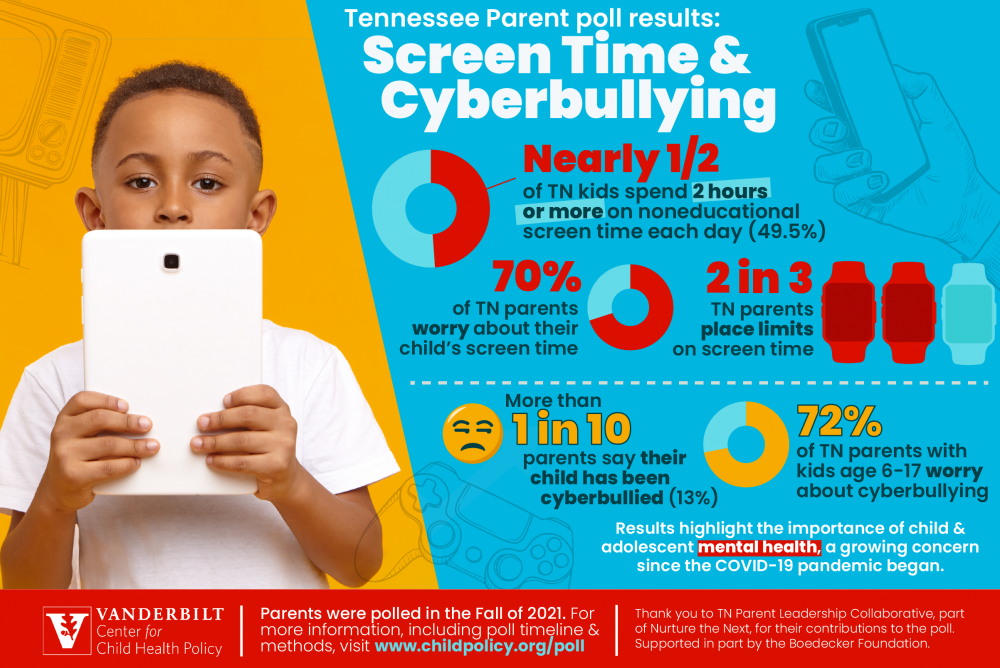Nearly 50% of Tennessee parents said their children spend 2 hours or more on noneducational screen time each day, despite over two-thirds of parents reporting that they place limits on screen time. Results come from the latest analysis of the annual Vanderbilt Child Health Poll.
The poll of 1,026 Tennessee parents in the fall of 2021 explored a range of topics affecting parents and kids around the state, with the most recent analysis exploring online behavior, screen time and cyberbullying.
More than 70% of parents said they have some level of worry about how much screen time their kids are getting, and a growing body of research suggests that their concerns are warranted.
“Children’s screen time can have both positive and negative impacts on their knowledge and intellectual development,” said Carolyn Heinrich, PhD, Patricia and Rodes Hart Professor of Public Policy, Education, and Economics at Vanderbilt University. “For example, experimental research confirms the potential for positive effects of educational screen media on children’s cognitive development; however, if screen time for entertainment displaces educational uses, especially when children are learning to read, the net effect may be harmful.”
Scroll down to continue reading...
Continued...
Most Tennessee (72%) parents are also worried about cyberbullying, and roughly 13% of parents said their child (age 6-17) has been cyberbullied. Most parents (62%) discovered their children were being cyberbullied by talking with their child, and another 33% by routinely checking their child’s phones or electronics. Most parents reported the cyberbullying took place on popular social media apps like Facebook, TikTok, Snapchat and Instagram, in addition to online video games.
Research has shown that cyberbullying frequently coincides with traditional, in-school bullying, yet contrary to traditional bullying, cyberbullying often does not stop at the end of the school day, Heinrich said.
“A child who owns a smartphone can be followed anywhere by a cyberbully, making them more vulnerable to the social, emotional, and academic harms that bullying can inflict on children,” Heinrich said.
Researchers said the results highlight the importance of youth and adolescent mental health topics gaining more attention over the past two years, in light of COVID-19 and children’s increased reliance on screens and technology for both educational and social communications.
Heinrich recommends parents talk regularly with their children about what they are doing with their screen time and encourage them to use programs or apps that connect to what they enjoy learning in school. Parents should also listen and try to be attentive to any social problems their children are experiencing online, and they should not hesitate to notify a school authority when they have concerns about their child’s online safety or emotional well-being.
A helpful resource for parents is the Children and Screens: Institute of Digital Media and Child Development, Heinrich said, a non-profit that offers resources and webinars for parents with age-specific guidance related to children’s screen time and development.
“Parents should be talking to their kids about screen time and cyberbullying,” said Stephen Patrick, MD, MPH, director of the Vanderbilt Center for Child Health Policy. “Most devices today allow parents to limit screen time and ensure access to only age-appropriate content. Parents are worried about screen time, and the fact that more than 1 in 10 Tennessee children have been cyberbullied means we have work to do. It’s never been more important to monitor your child’s online activity.”
The poll is funded in part by a grant from the Boedecker Foundation.






